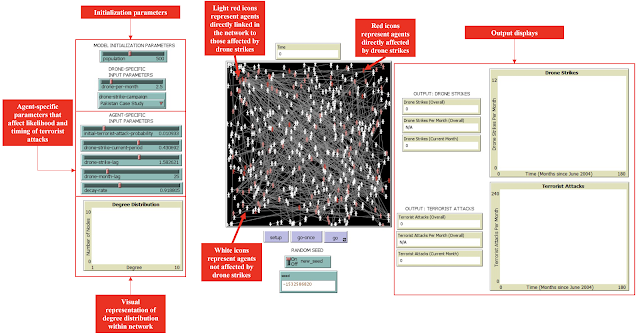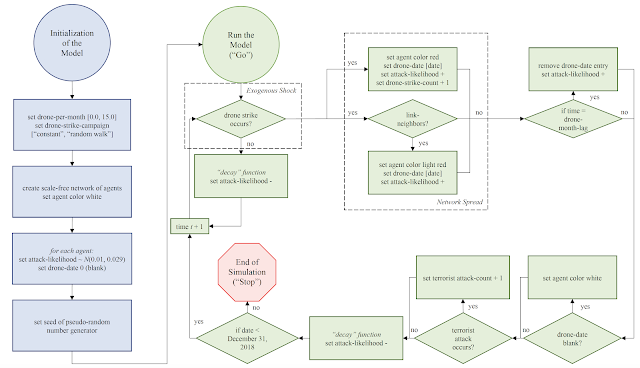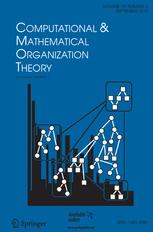In the past we had posted on models of radicalization, but such models were rather abstract. Building on this previous work Brandon Shapiro and myself have a new paper entitled "Drone Strikes and Radicalization: An Exploration Utilizing Agent-Based Modeling and Data Applied to Pakistan" which has recently been published in Computational and Mathematical Organization Theory journal. In the paper we develop and present an agent-based model informed by theory and calibrated using empirical data to explore the relationship between kinetic actions (i.e., drone strikes) and terrorist attacks in Pakistan from 2004 through 2018.
The data itself came from the Bureau of Investigative Journalism data as our source for Pakistan drone strikes (i.e., kinetic actions) and the National Consortium for the Study of Terrorism and Responses to Terrorism( START) Global Terrorism Database (GTD) as our source for terrorist incidents. Rather than try to pinpoint and define the motivating factors which might influence somebody down a path toward radicalization, our model that incorporated a distributed lag model to characterize the inter-dependencies between drone strikes and terrorist attacks observed in Pakistan. Based on parametric and validation tests, the model simulates a terrorist attack curve which approximates the rate and magnitude observed in Pakistan from 2007 through 2018.
If this sounds of interest, below we provide the abstract to the paper, along with some images of model graphical user interface, the model logic and some of the results. The model itself was created in NetLogo and is available at: https://www.comses.net/codebase-release/30540ae3-486b-44e4-8ff0-785575433af0/ (along with the data and detailed ODD of the model). At the bottom of the page you can find the full citation and a link to the paper.
Abstract:
The employment of drone strikes has been ongoing and the public continues to debate their perceived benefits. A question that persists is whether drone strikes contribute to an increase in radicalization. This paper presents a data-driven approach to explore the relationship between drone strikes conducted in Pakistan and subsequent responses, often in the form of terrorist attacks carried out by those in the communities targeted by these particular counter terrorism measures. Our exploration and analysis of news reports which discussed drone strikes and radicalization suggest that government-sanctioned drone strikes in Pakistan appear to drive terrorist events with a distributed lag that can be determined analytically. We leverage news reports to inform and calibrate an agent-based model grounded in radicalization and opinion dynamics theory. This enabled us to simulate terrorist attacks that approximated the rate and magnitude observed in Pakistan from 2007 through 2018. We argue that this research effort advances the field of radicalization and lays the foundation for further work in the area of data-driven modeling and drone strikes.
Keywords: Radicalization, Data-driven modeling, Drone strikes, Terrorism, Pakistan , Agent-based modeling.
 |
| Pakistan radicalization model’s graphical user interface. From left to right: model input param- eters, the agents’ social network and resulting model outputs |
 |
| The agent-based model flow diagram. |
 |
| Terrorist attacks simulated by Pakistan radicalization model qualitatively agree with real-world system. |
Full Reference:
Shapiro, B. and Crooks, A.T. (2022) Drone Strikes and Radicalization: An Exploration Utilizing Agent-Based Modeling and Data Applied to Pakistan, Computational and Mathematical Organization Theory. Available at https://doi.org/10.1007/s10588-022-09364-1. (pdf)


